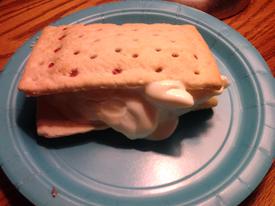muscle weighs more than fat true or fales
Options
Replies
-
No it does not weigh more, it weighs exactly the same but is denser and takes up less space!
^This!0 -
Does a cubic inch of muscle take up less space than a cubic inch of fat?No it does not weigh more, it weighs exactly the same but is denser and takes up less space!
^This!0 -
If a pound of muscle and a pound of fat are dropped from a 10 story building, which hits the ground first?0
-
 0
0 -
Oh look it's this discussion again. Neat.0
-
A pound of fat weighs the same as a pound of muscle, but muscle is more dense so you appear thinner with a higher volume of muscle.0
-
Pound of muscle burns 32 cals per day. Pound of fat burns 2 per day. Pick the one you would rather have.
That has nothing to do with the question.0 -
I know your opinion on that subject and just need to poke the bear :P
and just need to poke the bear :P
Looking at those 40 cals a day is a bit short-sighted, don't you think? We humans, if lucky, have a lifespan longer than an average mayfly... 40 cals/day * 365 days * 10 years = 146.000 calories (yeah I did not factor in leap years :P). There are approx 3500 cals in 1 pound, so that means if your calories intake is (only) 40 calories a day over your expenditure in 10 years you would gain approx 42 pounds (which is the case with most humans it would seem; gaining with age, that is, not gaining exactly 42 pounds)... Drop by drop as they say...
Ooh a debate - excellent :-)
I do love the math and it's impossible to argue with your sums but in practical application there are several problems with it:
1) 40 cals is c. 1.5% to 2% of a sedentary persons intake. Nutritional labels are allowed up to 20% deviation from those published on the packet to account for variability is source material. Attaining an exact figure for intake therefore is nigh on impossible and we have to rely on those averages to balance out. 40Cals is insignificant here.
2) It's easier to eat half a cookie less per day to hit your target than spend 4 hours a week lifting to enable you to eat that target(but again, I am a lifting advocate, many other benefits, I'm just arguing your point)
3) Caloric intake relation to fat storage isn't precisely binary. There isn't a summing up that is done at the end of the day when you are sleeping, it's going on every minute in the form of the balance of insulin and glucagon in your blood stream, and so the timing of the intake would have an effect. If the extra 40 cals were eaten alone, some hours after the previous meal you likely wouldn't have enough glucose to cause an insulin release from the pancreas and thus your body isn't in storage mode and you wouldn't gain a thing (of course if you ate it on top of a big meal it would be stored, but lets ignore that inconvenient fact).
4) You body is hugely adaptive and your metabolism doesn't just adapt downwards when starved. Small uplifts occur also so perhaps your 40 extra will be adapted to.
This is fun. Over to you!
Ahhh how I love me some good debate!
Alright, I was over-simplifying and I have to agree, there is no simple math when it comes to energy expenditure and weight.
1. Yes labels can have +/-20% deviation to actual calorie content, it is impossible to estimate 100% accurately, thus even more important to have the extra 40 calories each day!
2. It might be easier to eat half a cookie less each day – agreed! However, although it might seem easier to eat half a cookie less – few people actually do! Most will eat the whole cookie, and then eat one more to keep it company! The 40 additional calories your muscle burn are even more important in this (common) case!
3. and 4. Again, you are right! No summing up at the end of the day! But while we are at it, shall we contemplate those 40 calories we have been discussing? Why 40 calories? How do we know it is 40? My guess is you are referring to the findings of Dr. Cedric X. Bryant et al? A lot of controversy exists when it comes to RMR and the way that differences in body compositions affect it, so who knows – might be 40, might be 80! (That is a whole cookie right there!)
Whatever the final figure, one thing is certain – muscle unlike fat is a metabolically active tissue. To gain and keep muscles you need to train them. If you have muscles you are more likely to use them and theyalso burn more calories when recovering from exercise (unlike fat). Muscles have a significant influence on general feeling of well-being, on energy levels, on cognitive abilities, etc. plus a number of purely physiological functions and benefits. I think we can agree that having and retaining muscle over fat is an exercise that on the whole burns way more calories than sitting on the sofa all day, every day in effort to retain our… well, fat! Being more active in general would promote even higher calorie expenditure and less fat will be stored (even after a big meal)…
Plus, (to get back to the beginning) half a cookie is nothing to frown at!0 -
Pound of muscle burns 32 cals per day. Pound of fat burns 2 per day. Pick the one you would rather have.
That has nothing to do with the question.
I'm willing to bet if you light it on fire, the fat is going to burn a lot better.0 -
Pound of muscle burns 32 cals per day. Pound of fat burns 2 per day. Pick the one you would rather have.
That has nothing to do with the question.
I'm willing to bet if you light it on fire, the fat is going to burn a lot better.
So very true.0 -
Does this hold true south of the equator and/or if the measurement is metric? Does a kilogram of fat outweigh a kilogram of muscle during Daylight Savings time?0
-
Does this hold true south of the equator and/or if the measurement is metric? Does a kilogram of fat outweigh a kilogram of muscle during Daylight Savings time?
The weights would change from the equator as you moved south twords the pole.0 -
Does this hold true south of the equator and/or if the measurement is metric? Does a kilogram of fat outweigh a kilogram of muscle during Daylight Savings time?
The weights would change from the equator as you moved south towords the pole.
What about altitude? Will it weight less as I approach outer space?0 -
Does this hold true south of the equator and/or if the measurement is metric? Does a kilogram of fat outweigh a kilogram of muscle during Daylight Savings time?
The weights would change from the equator as you moved south towords the pole.
What about altitude? Will it weight less as I approach outer space?
Depends how close to the Moon you are.0
Categories
- All Categories
- 1.4M Health, Wellness and Goals
- 392.1K Introduce Yourself
- 43.6K Getting Started
- 259.9K Health and Weight Loss
- 175.7K Food and Nutrition
- 47.4K Recipes
- 232.4K Fitness and Exercise
- 403 Sleep, Mindfulness and Overall Wellness
- 6.4K Goal: Maintaining Weight
- 8.5K Goal: Gaining Weight and Body Building
- 152.8K Motivation and Support
- 7.9K Challenges
- 1.3K Debate Club
- 96.3K Chit-Chat
- 2.5K Fun and Games
- 3.4K MyFitnessPal Information
- 23 News and Announcements
- 982 Feature Suggestions and Ideas
- 2.4K MyFitnessPal Tech Support Questions








